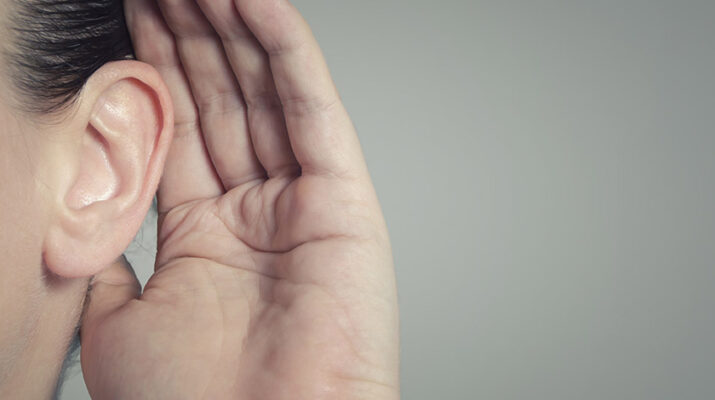By Deborah Jeanne Sergeant
Many people associate hearing loss with older war veterans or people who have worked for 40 years in a noisy factory.
However, many less well-known things can cause hearing loss.
Anna Fyalkowski, audiologist with Syracuse Hearing Solutions, said that although many people dismiss hearing loss as part of the aging process, many causes of hearing loss can be prevented or, if caught early, treated to preserve hearing.
“If you have sudden sensorineural hearing loss, it is like one day you wake up and you can’t hear out of one ear,” she said. “It’s scary but rare. We see it in our clinic. We try to get treatment as quickly as possible.”
Patients also may feel like their ear is full, dizziness and tinnitus — ringing in the ears. Since the onset is so rapid, many people assume that a minor illness or wax build-up is causing the symptoms.
Douglas G. Brown, audiologist and owner of DB Audiology Associates in Syracuse, said that Ménière’s disease is a condition many do not realize can lead to hearing loss.
“It creates problems with hearing and balance,” Brown said.
Typically, it causes one-sided hearing loss because of one of the fluids in the inner ear is too high. Treatment includes medications to manage the vertigo and nausea, diuretics and anti-anxiety medications.
The middle ear bones are part of the hearing process. When bony deposits accumulate on these bones (ossification), they become so stiff that their ability to conduct sound lessens.
“Otosclerosis, primarily in females, is hereditary,” Brown said. “Onset can occur around pregnancies. They haven’t figured it out why.”
Although unmanaged diabetes can bear many life-altering consequences, hearing loss is not one many people consider. Brown said that diabetics with unmanaged diabetes or hypertension can experience hearing loss.
“Smokers have a higher incidence of hearing loss than nonsmokers because instead of taking oxygen and nutrients to part of the body, it gets 46 different chemicals so that the ear, especially when under stress listening to high levels of sound, can’t get the nutrients to stay healthy,” Brown said. “The waste of what’s happening in the cells can’t get carried away.”
Benign growths on the acoustic nerve can also cause hearing loss. Called an acoustic neuroma or vestibular schwannoma, the growths compress the auditory nerve, causing hearing loss on one side, along with dizziness and facial nerve weakness. Brown said that tumors are typically slow growing and can cause reduced hearing clarity.
“They may attribute it to ‘It was too noisy or ‘That person mumbles,’” he said.
He added that autoimmune diseases can change hearing over time. Since some patients with one autoimmune disease tend to have a higher risk for other autoimmune diseases, they should be aware that hearing loss is a possibility.
Some medications can cause hearing loss. Called ototoxic, the amount of the medication taken matters. Anyone concerned about hearing loss as a medication side effect should discuss it with a care provider.
“There are also physical traumas to the ear,” Brown said. “I had a patient who was clearing his ear with a Q-Tip and his elbow hit the door. He perforated his eardrum. Sometimes these heal on their own. Sometimes they don’t. Surgery may improve that situation.”
In addition to avoiding cotton swab use in the ears (even the package says not to do so), wearing protective gear for sports is also important for protecting hearing. Brown said that skipping protective gear can result in displacement of the bones in the middle ear and hearing loss.
Most people realize that listening to loud music greater than 85dB can result in permanent hearing loss. They may not know that listening to recreational equipment or household, non-commercial tools can damage hearing.
Brown listed lawn mowers, snow blowers and chain saws, racecars as common culprits most people ignore as causes of hearing loss. Wearing hearing protective devices such as muffs and earplugs can prevent this hearing loss.
“Don’t let it go if you have sudden hearing loss,” said Kristopher Rookey, hearing instrument specialist with Port City Hearing in Oswego.
But it’s also vital to protect hearing from everyday damage, the “normal, everyday stuff like power tools, lawnmowers and grinding tools,” Rookey added. “A few hours on the lawn mower for a few years, you don’t really think of that as causing hearing damage. I’m always a big advocate for hearing protection.”
He explained that damage occurs because of the decibel level, how long exposure happens and how frequently it happens.
“You have to protect the hearing that you’ve got,” he said. “Most people who come in regret that they didn’t.
“Recognize if you have hearing loss and seek treatment sooner. That will get stimulation back to the brain and promote cognitive function. If you let it go, it can lead to isolation. Get back your quality of life.”

